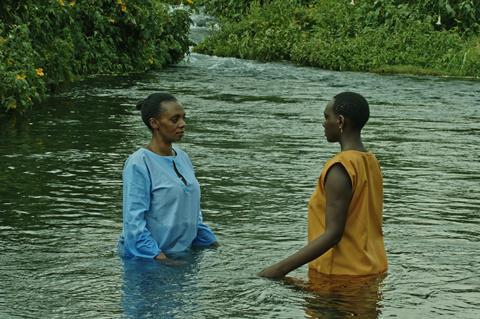Three intersecting family stories reveal the lasting trauma of Rwanda’s violent history

Dir/scr: Kivu Ruhorahoza. Rwanda. 2021. 111mins
The toxic presence of unreliable men provides the connecting tissue in Father’s Day. Kivu Ruhorahoza’s soulful, micro-budget feature weaves together everyday tales reflecting the bonds between parents and children. The stories all serve to reflect a Rwanda traumatised by the legacy of the 1994 genocide and the fault lines it exposed in the traditional patriarchal order. This measured, sensitively composed film should attract significant festival interest following a Berlinale world premiere.
This measured, sensitively composed film should attract significant festival interest
Ten years after his debut feature Grey Matter, Ruhorahoza continues to find ways to explore how the genocide of the past is a constant factor in the present. There are three story strands in Father’s Day. One tells of Zaninka (Mediatrice Kayitesi), a woman mourning the death of a beloved son and increasingly contemptuous of a husband (André Musagara) who always disappoints her. The story of Mukobwa (Aline Amike) is of a young woman who learns that she is a compatible donor for an ailing father desperately in need of an operation. Finally, there is the tale of Kadogo (Cedric Ishimwe) a young boy raised by Karara (Yves Kijyana) a bullying, unpredictable single father and inept small time crook determined to make a “man” of him.
There are some connections and overlaps between the stories but Ruhorahoza gives them an equal weight within a nicely balanced if slightly overlong production. He draws out a unifying sense of how the central characters constantly find themselves at the mercy of men defined by their inadequacy, wounded pride and sense of entitlement. Zaninka’s husband’s big dreams and failed schemes are always at her expense. When she works as a masseuse, it is taken for granted that she will provide “extras” for a price. “Why do you disrespect me?” she asks one insistent client. It is assumed that Mukobwa will sacrifice herself for a father, even though he doesn’t seem especially loving and there are hints of his role in past atrocities. Kadogo is constantly under threat from a father who thinks he knows best even as they barely scrape a living and the boy is denied a school education. Kadogo is already questioning his father’s influence and thwarts his money-making plan to steal and sell puppies by returning one of the mutts to its owners.
Ruhorahoza matches glimpses of life on the streets of Rwanda’s capital Kigali with lyrical moments in nearby villages and woods. An early scene has Kadogo throwing stones into the steady, age old flow of a muddy river hinting that he might be a force for disruption. Ruhorahoza favours close-ups in which the camera is fixed on an individual filmed against a stark backdrop. Mediatrice Kayitesi is particularly effective in these moments as waves of emotion crash over her dignified features. Her expressive eyes respond fiercely to the insults of a husband who has the temerity to suggest her bread-winning occupation demeans him. We gain a powerful sense of her revulsion and growing disdain for a man floating through life on an inflated notion of his own worth. No words are required to convey exactly what she is feeling. Aline Amike is also compelling in the scenes that require her to convey the anguish she feels over what is being asked of her.
Mukobwa has her nails done by Zaninka and a friendship begins. In their conversations, both women are present in the moment and it feels like one of the few times that we see either of them smile, laugh or appear at ease. Women without these men and the legacy they carry are infinitely better off. Father’s Day is set in the time of the pandemic; masks are worn, hands are sanitised and there is talk of the impact on livelihoods and daily existence. It is Zaninka who wisely observes: “we blame everything on this virus but it only shakes things that were not solid to begin with.” That neatly sums up a film in which the tales of loss, sacrifice and heartbreak all speak to Ruhorahoza’s broader sense of a country that needs to embrace change.
Production company/international sales: Iyugi Productions nidida87@gmail.com
Producers: Dida Nibagwire, Kivu Ruhorahoza, Gaël Faye
Cinematography: Taté
Editing: Kivu Ruhorahoza
Music: Michael Makembe
Production design: Ricardo Sankara
Main cast: Mediatrice Kayitesi, Aline Amike, Yves Kijyana, Cedric Ishimwe























